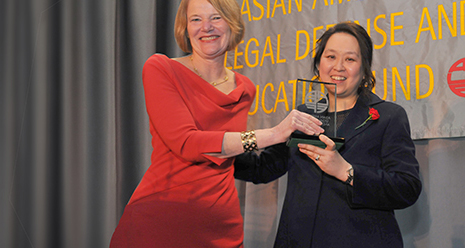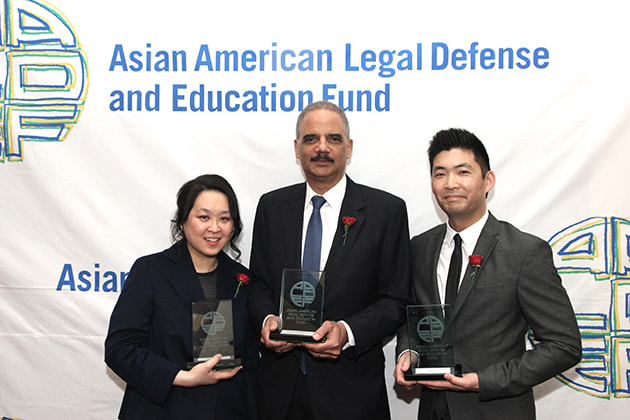
What Dignity Can Do for You: An Editorial by Heidi Chen of Zoetis
February 23, 2016
Heidi Chen, General Counsel for Zoetis, was recently presented with the 2016 Justice in Action Award by the Asian American Legal Defense Fund, which recognizes outstanding achievements and efforts in advancing social justice in the U.S. Below is an adaptation of Heidi’s remarks from the event.
Heidi Chen, General Counsel for Zoetis, was recently presented with the 2016 Justice in Action Award by the Asian American Legal Defense Fund, which recognizes outstanding achievements and efforts in advancing social justice in the U.S. Below is an adaptation of Heidi’s remarks from the event.
Recently I had the opportunity to speak at an Asian American Legal Defense Fund (AALDEF) event and I shared some thoughts on how dignity has shaped me both personally and professionally.
By definition, dignity is that internal sense of valuing oneself and it originates inside each of us. If intact and healthy, it fortifies us. It gives us the strength to speak our minds and the courage to act. It also can help us achieve great things and do the right thing. But as history has shown time and again, dignity can be eroded –through oppression, hate, and social and economic injustice. At an individual level, the decisions we make, how we treat others and our impact on others matter.
Putting Dignity to the Test
Here’s just one example of how dignity can be eroded. Growing up, I faced ridicule because of my race and my almond-shaped eyes. Even today, I can vividly picture the taunts in the sixth grade at the Franklin Middle School. At times it was really upsetting – but here’s the point: it was not debilitating. Instead, these incidents tested the strength of my dignity – and perhaps made it stronger. I have to credit both my father and mother, who emigrated to the U.S. from Taiwan in the early 1960s to attend graduate school for making sure that my sisters and I had a sense of self-worth and helped us keep it intact.
What Dignity Can Do – 3 Lessons Learned
With that in mind, here are three lessons I’ve learned: how to develop dignity, what it can do for you, and how to maintain it.
1. A healthy sense of dignity is not a given. You have to do your homework – namely, look closely into the mirror to understand yourself and in particular, your insecurities, weaknesses and biases. In addition, we can build our own dignity through the decisions we take in our lives and our impact on others. My wise father often says: “Self-reflect, self-diagnose and self-correct.”
2. A strong sense of dignity helps us achieve and do the right thing. The ladder to the executive suite – or whatever may be your top rung – is not necessarily straightforward. I learned that early in my law career when I was often assigned to what I thought were the least glamourous projects. One of those assignments was U.S. Customs work. Yet I heeded the words of William Brennan, former Associate Justice of the U.S. Supreme Court, who famously said, “There are no menial jobs…only menial attitudes.” Dignity also gave me the courage to navigate the twists and turns of the corporate world and become the General Counsel at Zoetis -– where women make up nearly half of the executive leadership team. Here, diversity has played an important role in not only in preventing the erosion of my dignity, but also in fortifying it.
3. Like most things in life, dignity requires maintenance and should not be taken for granted. There are two ways you can maintain it: one is through family and personal networks, and another, is by supporting public institutions and civic organizations. My dignity remains intact because I have great people around me: my boss, peers, Zoetis colleagues, mentors. They are my “guidance counselors” and they help me self-reflect, self-diagnose and self-correct. I said there are two ways to maintain dignity. One is your personal network. The second is through civic organizations like AALDEF. On a macro or societal level, these organizations, among other things, push back against the forces that may erode dignity.
Let’s think about the pivotal questions raised by former U.S. Supreme Court Associate Justice Brennan when deciding a constitutional law case: “Has individual dignity been honored? Has the worth of the individual been acknowledged?” I believe we should make these questions our compass.

The Asian American Legal Defense and Education Fund (AALDEF) presented the 2016 Justice in Action Awards to (from left to right) Heidi C. Chen, Executive Vice President and General Counsel of Zoetis; Eric H. Holder, Jr., former Attorney General of the United States and partner at Covington & Burling LLP; and Phil Yu, founder and editor of Angry Asian Man.
For more information about the AALDEF Justice in Action Awards, click here.